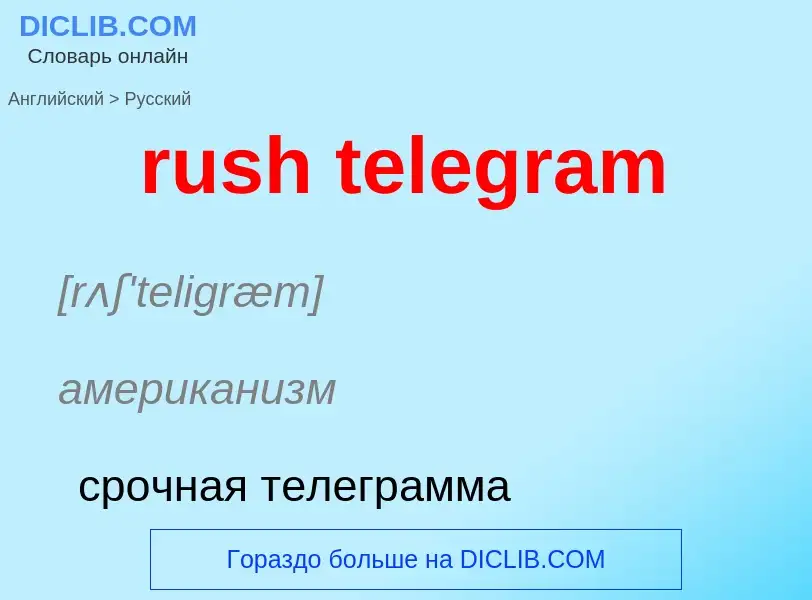Traduction et analyse des mots par intelligence artificielle
Sur cette page, vous pouvez obtenir une analyse détaillée d'un mot ou d'une phrase, réalisée à l'aide de la meilleure technologie d'intelligence artificielle à ce jour:
- comment le mot est utilisé
- fréquence d'utilisation
- il est utilisé plus souvent dans le discours oral ou écrit
- options de traduction de mots
- exemples d'utilisation (plusieurs phrases avec traduction)
- étymologie
rush telegram - traduction vers russe
[rʌʃ'teligræm]
американизм
срочная телеграмма
Définition
Wikipédia

The Höfle Telegram (or Hoefle Telegram) is a cryptic one-page document, discovered in 2000 among the declassified World War II archives of the Public Record Office in Kew, England. The document consists of several radio telegrams in translation, among them a top-secret message sent by SS Sturmbannführer Hermann Höfle on 11 January 1943; one, to SS Obersturmbannführer Adolf Eichmann in Berlin, and one to SS Obersturmbannführer Franz Heim in German-occupied Kraków (Cracow).
The Telegram contains the detailed statistics on the 1942 killings of Jews in the extermination camps of Operation Reinhard including at Belzec (B), Sobibor (S), Treblinka (T), and at Lublin-Majdanek (L). The numbers were compiled and quoted by Höfle, likely from the very precise records shared with the Deutsche Reichsbahn. Even though the Holocaust railway transportation records were notoriously incomplete as revealed by the Main Commission for the Investigation of German Crimes against the Polish Nation, the quoted numbers shed a new light on the evidential standard of proof for the scope of the crimes committed by the SS. The telegram gave train arrivals in the prior fortnight, as well as cumulative arrivals until 31 December 1942, for the extermination camps during the deadliest phase of the "Final Solution".


![German [[waybill]] prepared by ''Generaldirektion der Ostbahn'' on 3 August 1942 for shuttle train No. 548 departing from [[Warszawa Gdańska]] station to [[Treblinka]] beginning 6 August 1942 onward; exact timetable. Purpose: daily deportations; returning empty. No number of prisoners specified German [[waybill]] prepared by ''Generaldirektion der Ostbahn'' on 3 August 1942 for shuttle train No. 548 departing from [[Warszawa Gdańska]] station to [[Treblinka]] beginning 6 August 1942 onward; exact timetable. Purpose: daily deportations; returning empty. No number of prisoners specified](https://commons.wikimedia.org/wiki/Special:FilePath/Ostbahn Krakau shuttle train Warschau-Treblinka.jpg?width=200)
